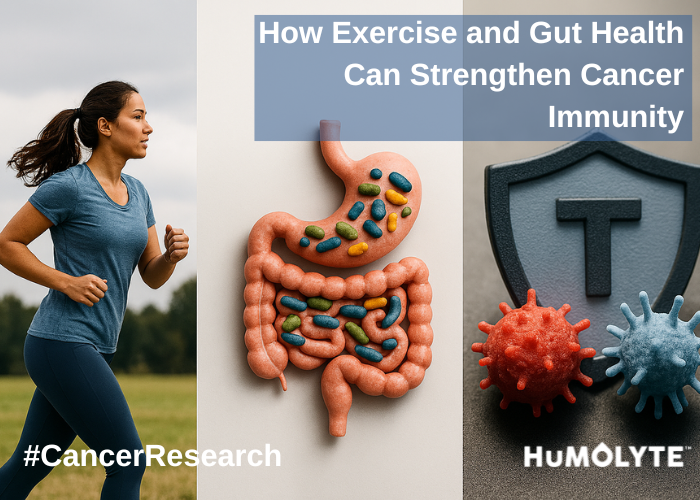How Exercise, Gut Health, and Immunity Intersect in the Cancer Journey
For cancer patients and caregivers, the path through diagnosis, treatment, and recovery is deeply personal and often overwhelming. While the role of medicine is central, emerging research is revealing a new layer of support—one that comes from within. Scientists are uncovering how regular exercise may improve cancer outcomes not just by strengthening the body, but by reshaping the gut microbiome in ways that enhance the immune system’s ability to fight cancer.
The Gut–Exercise–Immunity Connection
A recent study from the University of Pittsburgh sheds light on how the bacteria living in our digestive systems might be the missing link between physical activity and improved cancer immunity. In laboratory experiments with mice, researchers observed that those who exercised consistently over four weeks developed smaller tumors and had significantly better survival rates than their sedentary counterparts.
What’s particularly striking is that when the mice were given antibiotics to eliminate their gut bacteria, these benefits disappeared. This suggests that the gut microbiome plays a critical role in translating the effects of exercise into real biological changes that impact tumor growth.
Formate: A Key Metabolite with Big Potential
Digging deeper, the research team identified a molecule called formate, produced by gut microbes during exercise, as a likely driver of these immune-enhancing effects. In the study, formate was shown to activate CD8 T cells—immune cells that play a central role in attacking cancer cells. Mice that received formate supplementation, even without exercising, experienced tumor control similar to the exercising group.
In human patients with melanoma, higher levels of formate in the blood were associated with longer progression-free survival. This early evidence points to the possibility that formate—or the microbes that produce it—could eventually play a role in improving how well patients respond to cancer treatments, particularly immunotherapies.
What This Means for Patients and Caregivers
The idea that gut bacteria can influence cancer immunity may sound abstract, but it has practical implications. Moderate, consistent physical activity—not extreme or high-intensity—can begin to shift the gut microbiome in ways that strengthen immune response. Activities like walking, swimming, or light cycling three to five times per week may be enough to initiate these changes.
However, these effects appear to depend on continuity. Just like muscle strength fades without regular use, the positive changes in gut bacteria from exercise can diminish when the activity stops.
Diet is also a crucial piece of the puzzle. A diverse, plant-rich diet supports a healthy gut microbiome and complements the benefits of exercise. Fiber from vegetables, fruits, whole grains, legumes, and fermented foods provides the nourishment that beneficial microbes thrive on. Avoiding ultra-processed foods and maintaining a healthy body weight can further support microbial balance and reduce inflammation.
As always, any lifestyle changes should be discussed with your oncology team. Some cancer treatments or conditions may limit certain types of activity or dietary changes, and it’s important to personalize any recommendations to your individual health status.
Looking Ahead: Microbiome-Targeted Cancer Care
Researchers are now exploring how microbial metabolites like formate could be integrated into cancer treatment strategies. This could include direct supplementation, personalized nutrition, or even microbial transplants from individuals whose gut bacteria are particularly effective at supporting immune function.
While these interventions are still under study, the message is clear: our internal ecosystems matter. Exercise and gut health are not just wellness trends—they’re part of a broader, scientifically grounded approach to strengthening the body’s ability to combat cancer.
Final Thoughts
For those living with cancer or supporting someone who is, it’s empowering to know that actions as simple as walking regularly or eating more whole foods could have an impact on treatment outcomes. The connection between physical activity, the gut microbiome, and the immune system offers a hopeful reminder that the body is not just the site of illness, but also a powerful partner in healing.
If you'd like guidance on developing an exercise plan tailored for cancer recovery or suggestions on gut-friendly meals, feel free to reach out or explore additional resources. Small, steady steps can make a meaningful difference.
Reference
Are gut microbes the key to understanding how exercise boosts cancer immunity?
For more information on how HuMOLYTE can support your gut health during chemotherapy, visit our product page or consult your health care provider.
This blog was reviewed by Dr. Sourabh Kharait.
This blog is for educational purposes only and is not intended as medical advice. Always consult with your healthcare provider before making any changes to your treatment plan, hydration strategies, or diet. The information provided here is based on general insights and may not apply to individual circumstances.

